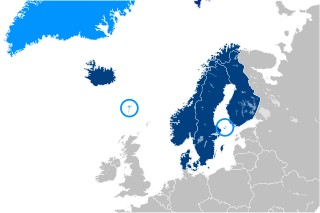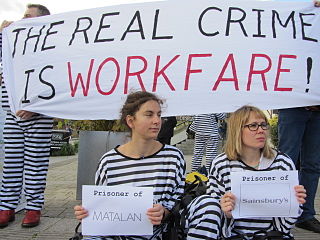Related Research Articles
A minimum wage is the lowest remuneration that employers can legally pay their employees—the price floor below which employees may not sell their labor. Most countries had introduced minimum wage legislation by the end of the 20th century. Because minimum wages increase the cost of labor, companies often try to avoid minimum wage laws by using gig workers, by moving labor to locations with lower or nonexistent minimum wages, or by automating job functions. Minimum wage policies can vary significantly between countries or even within a country, with different regions, sectors, or age groups having their own minimum wage rates. These variations are often influenced by factors such as the cost of living, regional economic conditions, and industry-specific factors.

The Swedish Social Democratic Party, formally the SwedishSocial Democratic Workers' Party, usually referred to as The Social Democrats, is a social democratic political party in Sweden. The party is member of the Progressive Alliance and the Party of European Socialists.

William Henry Beveridge, 1st Baron Beveridge, was a British economist and Liberal politician who was a progressive, social reformer, and eugenicist who played a central role in designing the British welfare state. His 1942 report Social Insurance and Allied Services served as the basis for the welfare state put in place by the Labour government elected in 1945.
Rent-seeking is the act of growing one's existing wealth by manipulating the social or political environment without creating new wealth. Rent-seeking activities have negative effects on the rest of society. They result in reduced economic efficiency through misallocation of resources, stifled competition, reduced wealth creation, lost government revenue, heightened income inequality, risk of growing corruption and cronyism, decreased public trust in institutions, and potential national decline.

Unemployment benefits, also called unemployment insurance, unemployment payment, unemployment compensation, or simply unemployment, are payments made by governmental bodies to unemployed people. Depending on the country and the status of the person, those sums may be small, covering only basic needs, or may compensate the lost time proportionally to the previous earned salary.

The working poor are working people whose incomes fall below a given poverty line due to low-income jobs and low familial household income. These are people who spend at least 27 weeks in a year working or looking for employment, but remain under the poverty threshold.
Workfare is a governmental plan under which welfare recipients are required to accept public-service jobs or to participate in job training. Many countries around the world have adopted workfare to reduce poverty among able-bodied adults; however, their approaches to execution vary. The United States and United Kingdom are two countries utilizing workfare, albeit with different backgrounds.

Peter Richard Grenville Layard, Baron Layard FBA is a British labour economist, co-director of the Community Wellbeing programme at the Centre for Economic Performance at the London School of Economics, and co-editor of the World Happiness Report. Layard is an economist who wants public policy to be targeted at the wellbeing of the people. To this end he has written 6 books and some 40 articles.

Temporary Assistance for Needy Families is a federal assistance program of the United States. It began on July 1, 1997, and succeeded the Aid to Families with Dependent Children (AFDC) program, providing cash assistance to indigent American families through the United States Department of Health and Human Services. TANF is often regarded as just "welfare", but some argue this is a misnomer. Unlike AFDC, which provided a guaranteed cash benefit to eligible families, TANF is a block grant to states that creates no federal entitlement to welfare and is used by states to provide non-welfare services, including educational services, to employed people.

Poverty reduction, poverty relief, or poverty alleviation is a set of measures, both economic and humanitarian, that are intended to permanently lift people out of poverty. Measures, like those promoted by Henry George in his economics classic Progress and Poverty, are those that raise, or are intended to raise, ways of enabling the poor to create wealth for themselves as a conduit of ending poverty forever. In modern times, various economists within the Georgism movement propose measures like the land value tax to enhance access to the natural world for all. Poverty occurs in both developing countries and developed countries. While poverty is much more widespread in developing countries, both types of countries undertake poverty reduction measures.

The Personal Responsibility and Work Opportunity Reconciliation Act of 1996 (PRWORA) is a United States federal law passed by the 104th United States Congress and signed into law by President Bill Clinton. The bill implemented major changes to U.S. social welfare policy, replacing the Aid to Families with Dependent Children (AFDC) program with the Temporary Assistance for Needy Families (TANF) program.
Active labour market policies (ALMPs) are government programmes that intervene in the labour market to help the unemployed find work, but also for the underemployed and employees looking for better jobs. In contrast, passive labour market policies involve expenditures on unemployment benefits and early retirement. Historically, labour market policies have developed in response to both market failures and socially/politically unacceptable outcomes within the labor market. Labour market issues include, for instance, the imbalance between labour supply and demand, inadequate income support, shortages of skilled workers, or discrimination against disadvantaged workers.

Social welfare has long been an important part of New Zealand society and a significant political issue. It is concerned with the provision by the state of benefits and services. Together with fiscal welfare and occupational welfare, it makes up the social policy of New Zealand. Social welfare is mostly funded through general taxation. Since the 1980s welfare has been provided on the basis of need; the exception is universal superannuation.

In economics, a negative income tax (NIT) is a system which reverses the direction in which tax is paid for incomes below a certain level; in other words, earners above that level pay money to the state while earners below it receive money. NIT was proposed by Juliet Rhys-Williams while working on the Beveridge Report in the early 1940s and popularized by Milton Friedman in the 1960s as a system in which the state makes payments to the poor when their income falls below a threshold, while taxing them on income above that threshold. Together with Friedman, supporters of NIT also included James Tobin, Joseph A. Pechman, and Peter M. Mieszkowski, Jim Gray and even then-President Richard Nixon, who suggested implementation of modified NIT in his Family Assistance Plan. After the increase in popularity of NIT, an experiment sponsored by the US government was conducted between 1968 and 1982 on effects of NIT on labour supply, income, and substitution effects.

Dennis J. Snower is an American-German economist, specialising in macroeconomic theory and policy, labor economics, digital governance, social economics, and the psychology of economic decisions in "caring economics".

Social security or welfare in Finland is very comprehensive compared to what almost all other countries provide. In the late 1980s, Finland had one of the world's most advanced welfare systems, which guaranteed decent living conditions to all Finns. Created almost entirely during the first three decades after World War II, the social security system was an outgrowth of the traditional Nordic belief that the state is not inherently hostile to the well-being of its citizens and can intervene benevolently on their behalf. According to some social historians, the basis of this belief was a relatively benign history that had allowed the gradual emergence of a free and independent peasantry in the Nordic countries and had curtailed the dominance of the nobility and the subsequent formation of a powerful right wing. Finland's history was harsher than the histories of the other Nordic countries but didn't prevent the country from following their path of social development.

The Social Research and Demonstration Corporation (SRDC) is an independent non-profit and non-partisan social policy research organization based in Canada, with a focus on designing, implementing and evaluating large-scale demonstration projects.

Workfare in the United Kingdom is a system of welfare regulations put into effect by UK governments at various times. Individuals subject to workfare must undertake work in return for their welfare benefit payments or risk losing them. Workfare policies are politically controversial. Supporters claim that such policies help people move off welfare and into employment whereas critics argue that they are analogous to slavery or indentured servitude and counterproductive in decreasing unemployment.
Welfare in California consists of federal welfare programs—which are often at least partially administered by state and county agencies—and several independent programs, which are usually administered by counties.
A wage subsidy is a payment to workers by the state, made either directly or through their employers. Its purposes are to redistribute income and to obviate the welfare trap attributed to other forms of relief, thereby reducing unemployment. It is most naturally implemented as a modification to the income tax system.
References
- ↑ Michalopoulos, Charles, Philip K. Robins and David Card. 2005. "When financial work incentives pay for themselves: evidence from a randomized social experiment for welfare recipients." Journal of Public Economics.
- ↑ Card, David; Michalopoulos, Charles; Robins, Philip (August 2001). "The Limits to Wage Growth: Measuring the Growth Rate of Wages For Recent Welfare Leavers". NBER Working Papers.
- ↑ Blundell, Richard (May 2002). "(Lecture) Welfare-to-Work: Which Policies Work and Why?" (PDF). ifs.org.uk. Archived from the original (PDF) on 9 August 2017.
- ↑ Bloom, Dan; Charles, Michalopoulos (May 2001). "How Welfare and Work Policies Affect Employment and Income: A Synthesis of Research" (PDF). mdrc.org. Archived (PDF) from the original on 16 Jan 2024. Retrieved 16 Jan 2024.